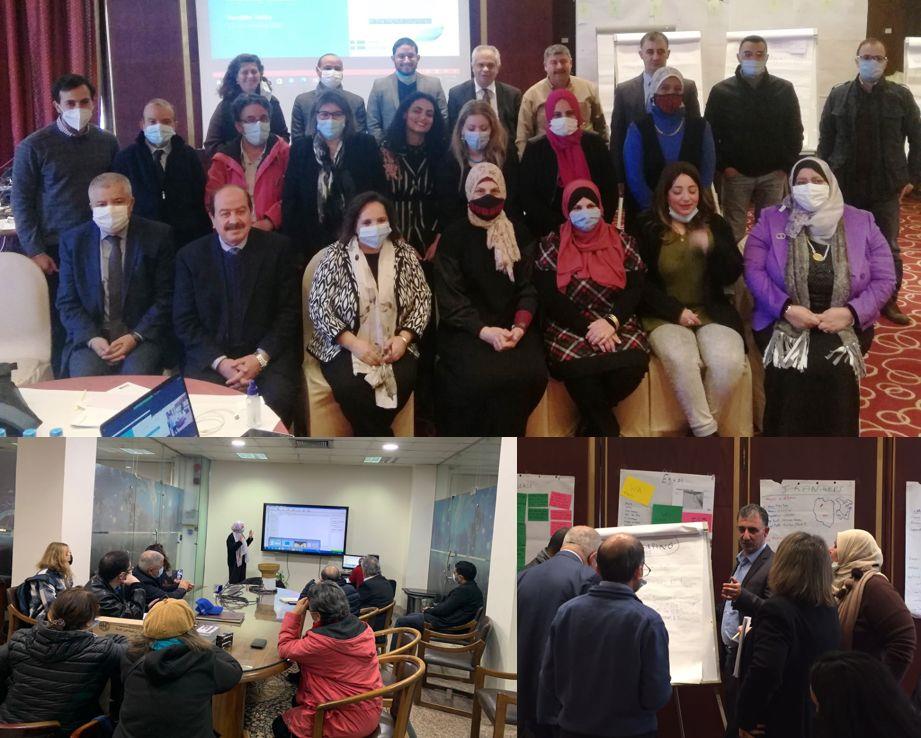The Steering Committee of the Water Efficiency, Productivity and Sustainability Regional Project meet to validate the final phase of the project and strategically plan the way forward.

25 January 2022 Cairo, The steering committee of the Water Efficiency, Productivity and Sustainability (WEPS-NENA) project in the Near East and North Africa (NENA) region met from the 23rd to 25th January in Cairo, Egypt. The meeting gathered the national focal points of the eight target countries as well as the leads of the key components of the project at regional and country level and FAO country teams. The 30 participants were from Algeria, Egypt, Jordan, Iran, Lebanon, Morocco, Palestine and Tunisia. The meeting reviewed the status and progress of the project; discussed sustainability and highlighted the importance of communication and capitalization of results.
The three-day steering committee meeting started with introductory speeches from Mr. Jörgen Persson, the Deputy Head of Mission of the Swedish Embassy in Egypt, Nasreldin Hagelamin, the FAO representative for Egypt, and JeanMarc Faures, the Regional Programme Leader of the FAaO-regional office for the NENA region. They all highlighted the importance of the work done by the project under the different components, as well as capitalization of the project results. The first day focused on the review of the results at regional and country level. The day concluded on the wealth of knowledge and knowhow developed in the 8 countries and the importance of the cross country exchange at regional level. All participants indicated that the key topics of the project –water accounting, water productivity and the Water-Energy-Food Nexus were at the center of strategies and policies today but needed to be now viewed through a climate change adaptation lense.
The second day of the meeting took the participants to the Egyptian Ministry of Water Resources and Irrigation (MWRI) and the National Water Research Centre (NWRC). The team visited different units under MWRI in Cairo, starting with the Nile Forecast Centre, which is the center responsible for producing the weather forecast three days in advance in addition to the Nile basin rain and flow forecast using satellite images, mathematical and climate models. The team then moved to the GIS and water accounting unit, which is the unit responsible in informing on water use and allocations of the distribution network including to using the Geographic Information Systems and the approach of water accounting using remote sensing; developing dashboards to support decision makers; analyzing image and remote sensing data to produce different products such as crop map, water balance; and designing of the forms and questionnaires used to collect data from the field via mobile applications. The next stop was at the Telemetry sector, which is the unit responsible for collecting real time data related to the water level, discharge and quality, and any requested data. It is worth adding that installation of measurement devices’ is one of the mandates of the telemetry sector. The team then moved to the research unit of the NWRC in Kanater and visited the Hydraulic Institute doing real size experiments reproducing smaller size prototypes of complex distribution infrastructure or phenomenon for modelling purposes with ground truth measurements. Experiments included Al-Minya multi-canals distribution, and the wave protection in Alexandria among others. These prototypes will help design the upgrading of the real size structures.
The third and final day of the steering committee meeting looked ahead and discussed the final plan of activities for the last six months of the project at country, sub-regional and regional level. It also reflected on the communication and stakeholder engagement work plan that will go along technical activities. The day was concluded by a short discussion on recommendations and insights on the next phase of the project.
The work of the steering committee meeting was prepared in a retreat of the eight countries project team the week before. The 21 members of the team did a critical review of their work while learning about new approaches and opportunities.
This steering committee meeting is implemented under the regional project “Implementing the 2030 Agenda for water efficiency/productivity and water sustainability in NENA countries”, under the Water Scarcity Initiative. This project is funded by the Swedish International Development Cooperation Agency.
